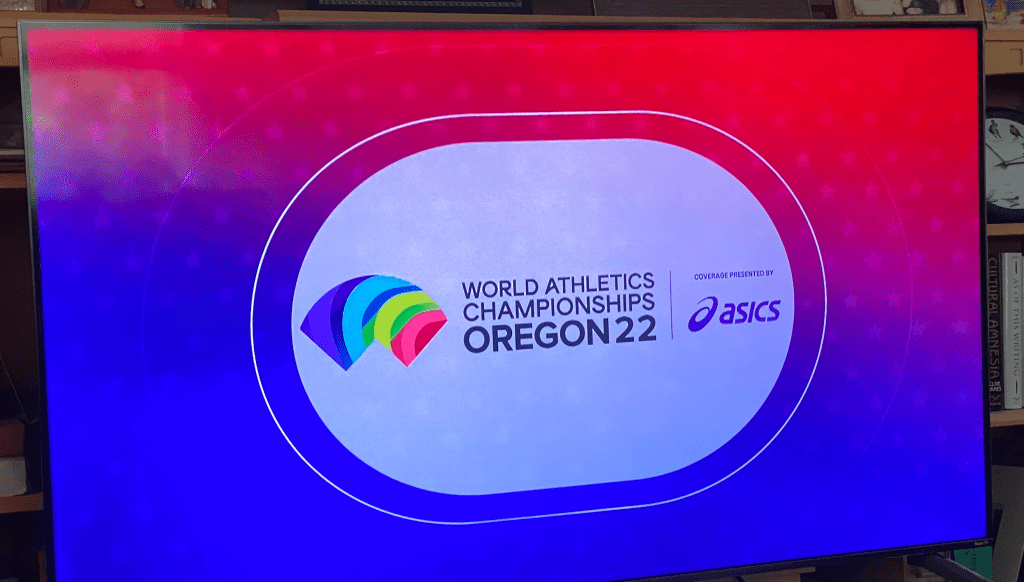At commercial breaks, NBC television coverage of a new-happening international competition shows this logo:

I wonder what American viewers make of it. As I have noted before, the U.S. and Britain have distinct meanings for the word “athletics.” In America, it’s a general, rather formal term referring to any sporting activity, including baseball, rowing, and ultimate Frisbee. That was the case in Britain as well, when the word was coined in the 1700s. A 1767 article in the London Chronicle refers to “Giving athletics the lead in this progression,… beginning with Scotch-hop, Foot-ball, Cricket, Tennis, Wrestling, Fencing, Hunting, &c.” But in the 1860s, a particular meaning developed in Britain. As the OED defines it: “Track and field events, including running races and various contests in jumping and throwing; the practice or sport of competing in these.” The dictionary quotes a 1959 line from the BBC comedy series Hancock’s World: “Athletics dear. Throwing things, jumping about, running, all that lark.”
In America, for well over a century, the term for these endeavors” has been “track and field.”
But it is alone in this in the English-speaking world, which is why the biennial competition currently taking place is called the World Athletics Championships.
Take it from me, the idea of “athletics” meaning running and jumping about is completely foreign to Americans, and it has been interesting to see how the U.S. media deals with the name of this important event. Other than showing the logo, they pretty much have not. Generally, they’ve gone with lower case and referred to it as “track and field” championships, or, as in this TV listing in the Philadelphia Inquirer, just left out the problematic word “Athletics”:

The New York Times has published multiple articles every day for the past week or so on the event, and by my count has only referred to it by its actual name three times. Once was in this passage, referring to Nike founder Phil Knight, which also included another NOOB!



Most British people are aware that Americans have a different term for athletics but accept that Americans are free to call the sport whatever they wish, without being at all confused. Given that “track and field” define where rather than what activities take place, I assume that swimming is known as “water and pool”.
That OED reference to “Hancock’s World” seems odd. I’d never heard of it.
Hancock’s Half Hour was a popular comedy series on BBC radio and television during the ’50s and starred Tony Hancock. I’ve never heard of Hancock’s World. Maybe an error. It certainly sounds like Anthony Aloysius St.John Hancock.
I suppose the OED meant to quote “Hancock’s half hour, 1959”. See (https://notoneoffbritishisms.com/2021/01/15/codswallop/) or “Hancock’s world, 1995”.
The OED did quote Hancock’s Half Hour. Ben Yagoda miscopied the citation.
In Canada, track and field activities are governed by Athletics Canada but competitions are referred to as “Track and Field Championships” and most people refer to it as “track and field”. So, the states isn’t all that alone in the English speaking world.
Track and field/athletics is an odd sport in that there is also no solid word for someone who does it in any language I am familiar with. “Athlete,” is the word used in lots of languages, but, at least in every case I can think of, that use is not only used for those who are track and field athletes. Americans eschew “athlete” and tend to say someone runs track or is a pole vaulter or something else descriptive, but even those languages that call a person competing in “athletics” an “athlete” almost always add something more specific.
Wikipedia has separate articles (A) “Sport of athletics” and (B) “Track and field”. The article on A says “The most common types of athletics competitions are track and field, road running, cross country running, and racewalking.”
I think there is not much point in trying to draw a distinction between A and B. Most other languages’ Wikipedias have only an article on A, usually called “athletics”, “light athletics”, or “free athletics”; they have no article B. I think “free athletics” would be a groovy name all anglophones could get behind.
Americans do seem to be particularly unable to cope with anything outside their usual experience.
Yes, I’m American and having a difficult time with sweeping generalizations right now.
Americans do seem to be particularly unable to cope with anything that might be thought to be mildly critical 😀
“In America, for well over a century, the term for these endeavors” has been ‘track and field.’ But it is alone in this in the English-speaking world.”
This is not really true. We say track and field in Canada. Perhaps you meant “North America”? Also, “alone in this” seems like a rather odd thing to say when you’re talking about hundreds of millions of people. Grant Hamilton, traducteur agréé
Tél. : 418 529-6928 | 514 780-1707 | 1 866 529-6928 ghamilton@anglocom.com
http://www.anglocom.com/
Renseignements et nouveaux mandats : anglocom@anglocom.com
Ah! The British meaning of athletics, the sport I chose to do at school instead of cricket, which struck me as the most pointless game ever devised.
Happy days of flinging myself over hurdles, sprinting the 100 yards – I was fast – and, best of all, the triple jump into the sandpit.
Oh, and using ‘America’ to mean the U.S. is paralleled by the widespread use of ‘English’ to include the whole of the United Kingdom, which gets right up the nose of Scots in particular.
Definition: International Association of Athletics Federations (IAAF) is the international governing bodyfor the sport of athletics, covering track and field, cross country running, road running, race walking, mountain running, and ultra running. This means that the IAAF referred to track and field as a specific sport within their domain. Meaning the Americans are correct.